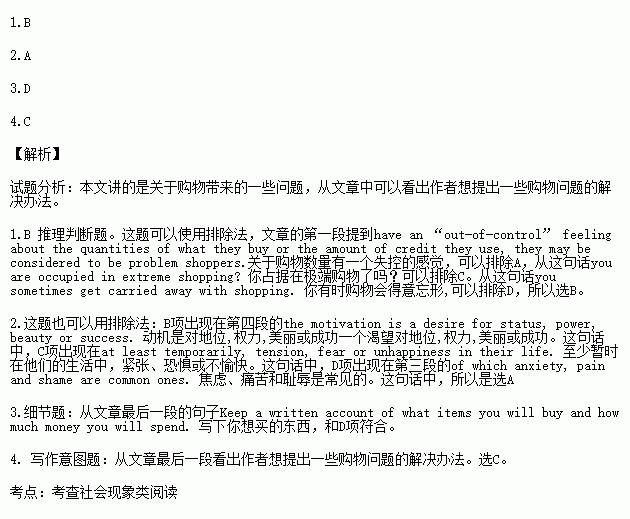题目内容
Are you a problem shopper? The answer is “Yes”, if you or someone else thinks that you sometimes get carried away with shopping. In other words, do you or does someone else think you are occupied in extreme shopping? If people have regrets later about their shopping, or have an “out-of-control” feeling about the quantities of what they buy or the amount of credit they use, they may be considered to be problem shoppers.
Extreme shopping can lead to a more serious problem — addictive shopping. Addictive shoppers feel driven by the desire to shop and spend money. They experience great tension which drives them to shop and spend money and they feel a “rush” during the time they are occupied with the shopping activity.
Extreme or addictive shopping may result from long-time unpleasant feelings, of which anxiety, pain and shame are common ones. When we feel bad inside, we often do something to make ourselves feel better. In this case, we often go shopping.
A few people shop to relieve their boredom or emptiness. For some people, the motivation is a desire for status, power, beauty or success. Some love to shop as it makes them feel valued in the eyes of the shop assistants. Others shop simply because it makes them forget, at least temporarily, tension, fear or unhappiness in their life.
Besides, shopping malls are designed to encourage continual shopping. For instance, there are some malls where you can’t see clocks displaying the time because they don’t want you to become too aware of the time you spend there. What’s more, food courts, coffee shops and restrooms are provided, so you don’t have to leave the mall because of your physical needs.
Therefore, once you become aware of how market forces work, you will certainly come to control your shopping behavior. For example, how much time you will spend and what areas you will visit can be decided before you enter the mall. Keep a written account of what items you will buy and how much money you will spend. Make a plan for what you are going to buy before you feel the urge to shop and then stick to it. That is vital for gaining self-control.
1.Which of the following people may not be problem shoppers?
A. Those who cannot control the amount of credit they use.
B. Those who just walk around the shopping malls.
C. Those who are occupied in too much shopping.
D. Those who feel sorry for their shopping.
2.According to the passage, what may not result in addictive shopping?
A. The awareness of how market forces work.
B. The desire for status, power, beauty or success.
C. Boredom, emptiness, tension, fear or unhappiness in people’s life.
D. Long-time bad feelings of anxiety, pain and shame.
3.What does the author suggest to control our shopping behaviour?
A. Never going to the shopping malls because there are many tricks.
B. Applying for a credit card before we go shopping.
C. Making the shopping time as short as possible.
D. Making a shopping list before we go shopping.
4.The author writes this passage to _______.
A. inform the shopping malls how to attract more shoppers
B. scold the problem shoppers
C. provide solutions to the problem shopping
D. tell a shopping story

